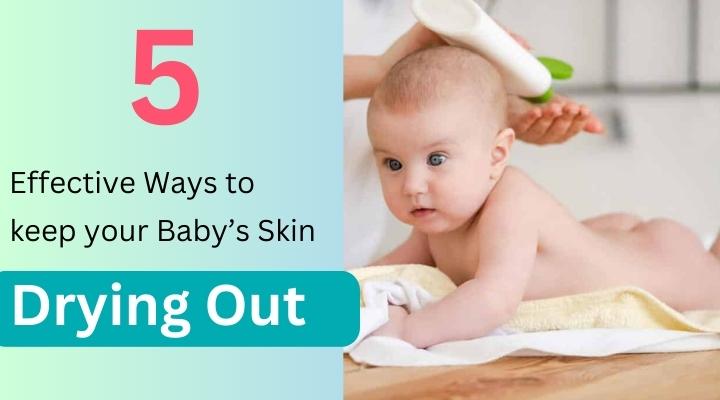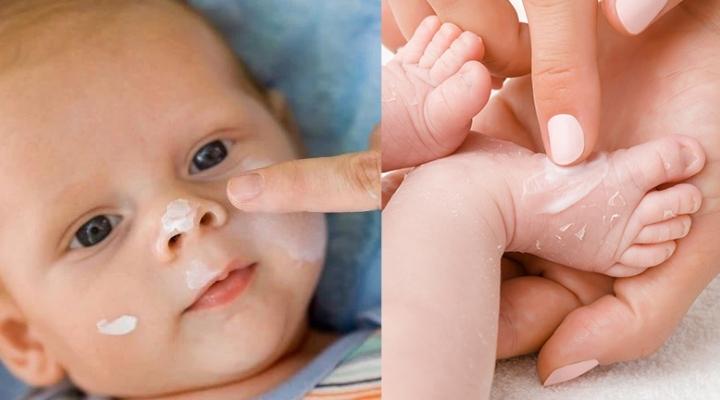5 Effective Ways to keep your Baby’s Skin Drying Out
The soft and delicate skin of a baby requires special care and attention to maintain its natural moisture and protect it from drying out. In this article, we will explore 5 Effective ways to keep your baby’s skin healthy, hydrated, and free from dryness. As a parent or caregiver, it is essential to be proactive in safeguarding your little one’s skin from dryness, which can lead to irritation, discomfort, and even more severe conditions.
5 Effective Ways to keep your Baby’s Skin Drying Out
1. Choose Gentle and Moisturizing Products-
The first step in preventing your baby’s skin from drying out is to select gentle and moisturizing products suitable for their delicate skin. When choosing soaps, shampoos, and lotions, opt for those specifically designed for infants or labeled as “gentle,” “hypoallergenic,” and “fragrance-free.” Avoid products containing harsh chemicals, strong fragrances, or artificial colors, as they can strip the skin of its natural oils and disrupt the skin’s barrier function.
Look for products with natural ingredients like chamomile, aloe vera, shea butter, and oat extracts, as these substances have soothing and moisturizing properties that can help lock in moisture and maintain the skin’s suppleness. Perform a patch test before using any new product on your baby’s skin to ensure they do not have an adverse reaction.
2. Limit Bath Time and Use Lukewarm Water-
Bathing is an important part of maintaining good hygiene for babies, but excessive bathing or using hot water can lead to dry skin. Prolonged exposure to water can strip away the natural oils present on the skin, leaving it dry and vulnerable. To prevent this, limit your baby’s bath time to around 5-10 minutes and use lukewarm water instead of hot water.
Additionally, avoid using harsh soaps or bubble baths during every bath. Instead, use a mild, moisturizing cleanser only when necessary, such as after diaper changes or if there are visible signs of dirt or grime. Always pat your baby’s skin dry with a soft towel after the bath, rather than rubbing, to avoid further irritation.
Related-Must-Know Tips About Diapering – Every Parent Should Know
3. Apply Moisturizer Regularly-
Moisturizing is a crucial step in preventing your baby’s skin from drying out. After each bath and whenever you notice dry patches, apply a gentle and hypoallergenic baby moisturizer to keep the skin hydrated. Look for products containing natural emollients, such as coconut oil, jojoba oil, or almond oil, as they can help form a protective layer on the skin, preventing moisture loss.
For babies prone to dry skin or eczema, consider using a thicker ointment or cream instead of a lotion, as these provide more intense hydration and protection. Pay extra attention to areas like the elbows, knees, and diaper area, as they are more susceptible to dryness.
4. Dress Your Baby Appropriately
The type of clothing your baby wears can significantly impact their skin health. Choosing breathable fabrics helps reduce the risk of skin irritation and allows air circulation, preventing excessive sweating and subsequent dryness. Follow these guidelines when dressing your baby:
Opt for Natural Fabrics-
Choose clothing made from soft, natural materials like cotton and bamboo. These fabrics are gentle on the skin and less likely to irritate.
Also check – How To Give Baby A Sponge Bath?
Avoid Synthetic Fabrics-
Refrain from dressing your baby in synthetic materials like polyester, as they can trap heat and moisture, leading to discomfort and skin dryness.
Dress your baby according to Weather-
Adjust your baby’s clothing according to the weather conditions. In colder months, layer up to keep them warm, and in warmer months, dress them in lightweight, breathable clothing.
Use Soft Laundry Detergents-
Wash your baby’s clothes with mild, hypoallergenic detergents. Harsh chemicals in regular detergents can irritate the skin, especially for babies with sensitive skin.
5. Maintain Proper Humidity Levels-
Dry indoor air can contribute to your baby’s skin drying out. Maintaining adequate humidity levels in your home helps prevent skin dryness and provides relief from dry, itchy skin. Here’s how you can maintain proper humidity levels:
Use a Humidifier-
Invest in a good-quality humidifier for your baby’s room, especially during dry seasons or in regions with low humidity. A humidifier adds moisture to the air and helps keep the skin hydrated.
Regularly Clean the Humidifier-
It is essential to clean and change the water in the humidifier regularly to prevent the growth of mold and bacteria, which can be harmful to your baby’s health.
Monitor Humidity Levels-
Keep an eye on the humidity levels in your baby’s room. Ideally, the humidity should be between 40% to 50%.
Caring for your baby’s skin is sensitive, and taking proactive steps to prevent dryness is crucial to their overall health and comfort. By choosing gentle and moisturizing products, limiting bath time, applying regular moisturizers, dressing them appropriately, and maintaining proper humidity levels, you can effectively keep your baby’s skin from drying out. Remember, consistency is key, and observing your baby’s skin for any signs of dryness or irritation will enable you to adjust your skincare routine accordingly. Always consult a pediatrician if you have concerns about your baby’s skin or if you suspect any skin condition that requires medical attention. With proper care and attention, your baby’s skin can remain soft, supple, and healthy.
Frequently Asked Questions-
Why is my baby’s skin drying out?
A baby’s skin is more delicate and sensitive compared to adult skin. It can easily lose moisture and become dry due to several factors. Some common reasons for a baby’s skin drying out include low humidity levels, harsh soaps or bathing products, excessive bathing, exposure to cold weather, using rough fabrics for clothing, and certain skin conditions.
When should I consult a pediatrician about my baby’s dry skin?
If your baby’s dry skin persists despite following the above tips, or if you notice any signs of skin irritation, redness, or discomfort, it’s essential to consult a pediatrician. They can evaluate your baby’s skin condition, rule out any underlying skin issues, and provide appropriate medical advice or treatment.
Can I use adult skincare products on my baby’s skin?
It’s generally not recommended to use adult skincare products on a baby’s delicate skin. Baby skin is more sensitive and requires milder formulations. Adult skincare products may contain harsh chemicals or fragrances that can be too strong for a baby’s skin and lead to irritation or allergic reactions. Always opt for baby-specific products that are formulated to be gentle and safe for infants.
Are there any natural remedies to prevent a baby’s skin from drying out?
While natural remedies can be helpful, it’s crucial to consult your pediatrician before trying any new products on your baby’s skin. Some natural options to consider include using natural oils like coconut oil or almond oil as moisturizers, incorporating oatmeal into bath water, and ensuring proper hydration by encouraging your baby to drink sufficient fluids. However, individual reactions to natural remedies can vary, so it’s best to seek professional advice first.










